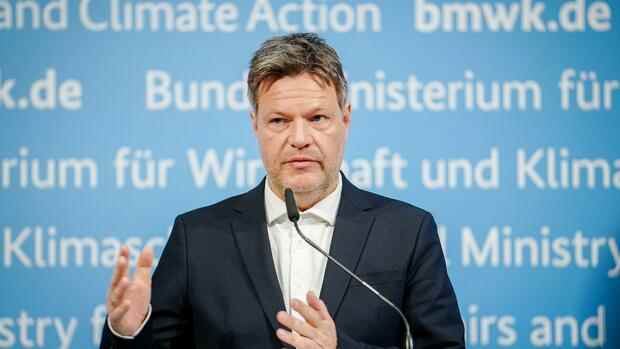An immediate embargo would have “considerable economic and social consequences”.
(Photo: dpa)
Berlin Federal Economics Minister Robert Habeck (Greens) has had initial successes in the fight against dependence on Russian energy supplies. According to Habeck, the share of Russian deliveries of coal will fall from 50 to 25 percent in the coming weeks. Coal plays an important role in the operation of power plants.
By early summer, a large number of power plant operators will have completely dispensed with coal from Russia, Habeck said on Friday. He promised that Germany could become completely independent of Russian hard coal by autumn.
The world market for hard coal is very liquid. Suppliers such as Australia, Indonesia or the USA are ready to fill the gaps caused by the loss of Russian supplies.
However, the logistical effort is great due to longer transport routes and bottlenecks in the hinterland connections to seaports. In addition, power plants in which Russian coal was previously fired must be converted to other coal qualities.
Top jobs of the day
Find the best jobs now and
be notified by email.
According to Habeck, there has already been significant progress in oil. The share of Russian oil has fallen from 35 to 25 percent. According to Habeck’s ministry, Russian oil imports to Germany are expected to be halved by the middle of the year.
The most difficult part is turning away from Russian supplies of natural gas. Last year, 55 percent of the natural gas consumed in Germany came from Russia. The proportion has already fallen to 40 percent, said Habeck. “As early as the summer of 2024, we could have made ourselves independent of Russian gas,” said Habeck.
Floating LNG terminals, known as Floating Storage and Regasification Units (FSRU), are playing a key role in the move away from Russian natural gas. Habeck said three floating LNG terminals were secured, which the companies RWE and Uniper “have optioned on behalf of the federal government”.
Depending on its size, an FSRU has the capacity to process five to ten billion cubic meters of gas per year. Arithmetically, gas import capacities of up to 30 billion cubic meters would result from three FSRUs. To put this in context: 60 billion cubic meters of gas flowed through the Nord Stream 1 Baltic Sea pipeline last year.
More on the subject:
Within just four weeks, i.e. since the start of the Russian attack on Ukraine, “considerable successes” have been achieved in reducing dependence on Russian energy supplies, Habeck said. There is great agreement among Western countries to become independent of Russian energy supplies “in order to put a stop to Putin’s work,” said the minister.
“Companies are phasing out contracts with Russian suppliers, not renewing them and switching to other suppliers,” he said. The whole thing is happening at an “insane pace”.
Despite the initial successes, the economy minister warned against imposing an immediate embargo on Russian energy supplies. “We cannot afford an embargo immediately,” he warned. An immediate embargo would have “considerable economic and social consequences”.
Habeck and Chancellor Olaf Scholz (SPD) have been taking this line for weeks. However, there are also voices in the traffic light coalition calling for an immediate embargo. For example, Green Party politician Anton Hofreiter said on Friday that Europe must immediately do without gas, oil and coal from Russia.
Habeck held back with regard to Russia’s announcement that it would only accept ruble payments for energy supplies in the future. It is now important that Europe and America coordinate their actions, he said.
More: Freezing seniors, no bread, no milk – what happens when there is no gas
